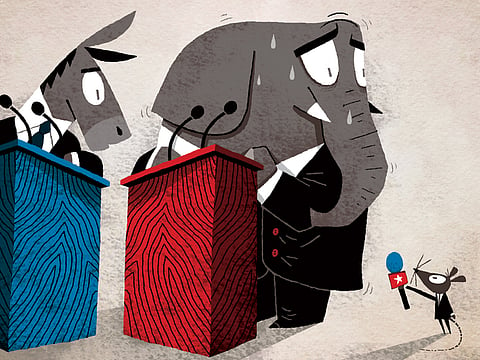It’s small stuff that wrecks presidential runs
This time, there has been no signature vote or event, but all it takes is one awkward comment to spoil the show

US presidential campaigns usually are not sunk by major policy mistakes or the attacks of an opponent. They result from self-inflicted, unforced errors.
This was apparent anew when Jeb Bush, the establishment favourite for the 2016 Republican presidential nomination, recently tripped over himself as he tried, repeatedly, to answer a simple, predictable and fair question: Knowing what we know now would you have invaded Iraq in 2003?
This is not fatal for Jeb, though he can ill-afford many more such fumbles. He will be hit with other questions on the shortcomings of his brother, former president George W. Bush, such as his botched 2005 effort to overhaul Social Security.
But the incident is a useful reminder of how presidential campaigns are derailed. Consider:
- Mitt Romney probably wouldn’t have won the general election in 2012 anyway. But Election Day was seven weeks away when he was surreptitiously taped telling wealthy Florida donors that President Barack Obama automatically would get 47 per cent of the vote, representing those who “are dependent upon government, who believe they are victims”. Such people, he said, “believe they are entitled to health care, to food, to housing, to you name it”. (Self-inflicted wounds may be a family tradition: Years earlier, the presidential campaign of his father, George Romney, effectively ended when he said his support for the Vietnam War was the result of “brainwashing.”)
- Rick Perry, the Texas governor, was a hot Republican contender in 2011. Then, as he attempted to list the three government agencies he would eliminate, he could not remember the third. “Sorry, oops,” he said.
- President Gerald Ford was closing the gap against Democrat Jimmy Carter a month before the 1976 election when, in a debate, he declared: “There is no Soviet domination of Eastern Europe.” The Berlin Wall did not fall for another 13 years.
Democrats, too, have made devastating and defining unforced errors:
- In 1979, Edward M. Kennedy, favoured to topple the incumbent Carter, was asked, in an interview why he wanted to be president. The Massachusetts Democratic senator gave a rambling answer from which he never recovered.
- Nine years later, presidential nominee Michael Dukakis, trying to burnish his national security credentials, posed for photographs riding in an Abrams tank. He looked more like Snoopy chasing the Red Baron than a commander in chief. The image stuck.
- In 2004, John Kerry, when talking about a military appropriations bill for operations in Iraq and Afghanistan, volunteered that he “actually did vote for the $87 billion [Dh319.9 billion] before I voted against it”. He had supported an alternative measure, but the waffler label stuck. (Kerry lacked the dexterity of president Bill Clinton who in 1992 escaped harm when asked about whether he would have supported the 1991 Gulf War resolution. He said, “I would have voted with the majority if it was a close vote,” then added, “but I agree with the arguments the minority made.”
Sometimes candidacies are undone by larger matters. Former House Speaker Newt Gingrich was a long shot to win the 2012 Republican nomination. But any slim hope evaporated when it was disclosed he privately accepted $1.6 million to help Freddie Mac, the mortgage giant, and a favourite target of conservatives during the financial crisis.
The most consequential was senator Hillary Clinton’s support for a measure authorizing the Iraq war, probably the most important vote she cast. She defended the decision in her 2008 presidential campaign, though she now says it was a mistake. Yet if she’d voted against the war, there might not have been a Barack Obama candidacy and she would be completing her second term in the White House.
This time, there probably is not any signature vote or event. However, the winnowing process of the huge field — particularly on the Republican side — will be made easier when some of the candidates say or do something small and stupid.
— Washington Post
Sign up for the Daily Briefing
Get the latest news and updates straight to your inbox



